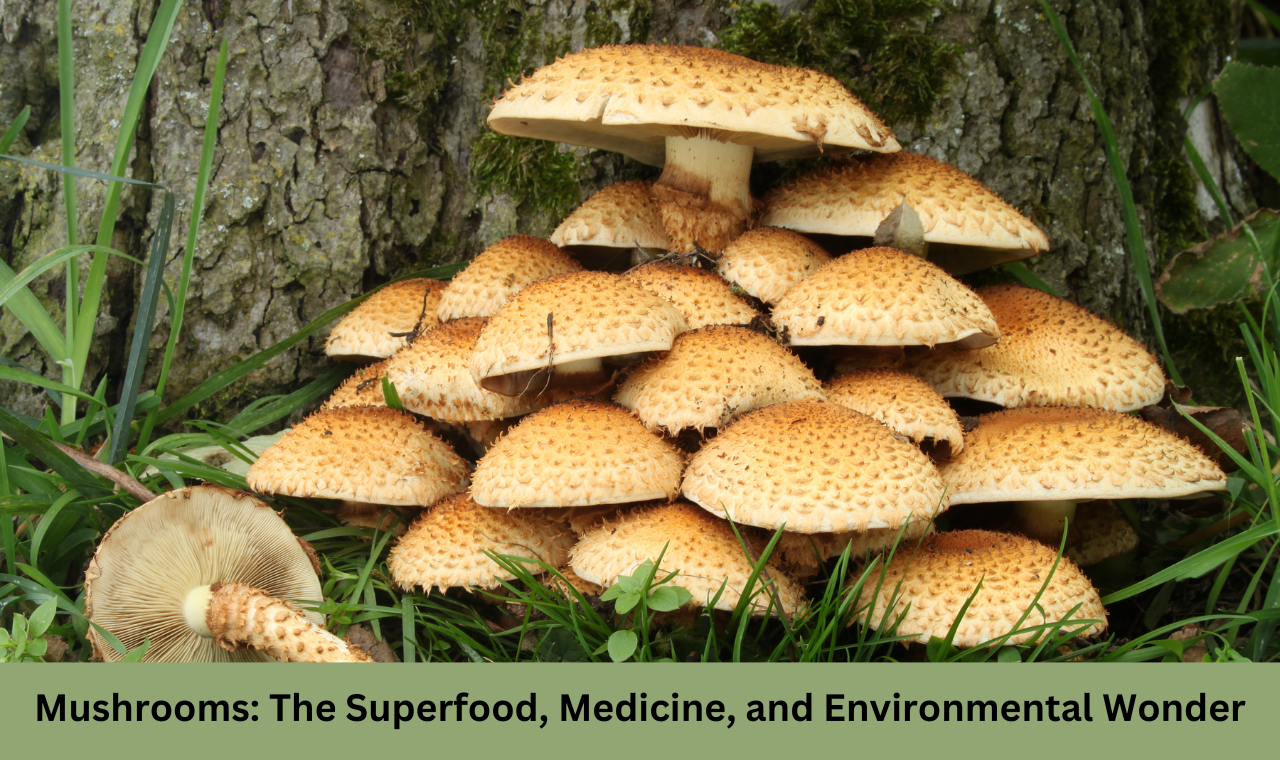Mushrooms, often mistaken for plants, are actually fungi with remarkable characteristics that set them apart in nature. From their rapid growth and nutritional benefits to their crucial role in ecosystems, mushrooms are far more than just a culinary delight. They have been used for centuries in traditional medicine, studied for their environmental benefits, and even explored as potential solutions for sustainable living.
In this article, we dive deep into the fascinating world of mushrooms, their benefits, environmental impact, and why they deserve more attention.
What Are Mushrooms?
Mushrooms are the fruiting bodies of fungi, emerging above ground to release spores for reproduction. Unlike plants, they do not rely on photosynthesis but instead absorb nutrients from organic matter. These fungi play vital roles as decomposers, symbionts, and sometimes even pathogens in ecosystems.
According to the United States Department of Agriculture (USDA), mushrooms are classified as vegetables for dietary purposes, but scientifically, they belong to an entirely different kingdom of life—Fungi.
Amazing Facts About Mushrooms
Mushrooms are among nature’s most unique organisms, and here are some incredible facts about them:
1. Rapid Growth
Mushrooms are some of the fastest-growing organisms on Earth. Under the right conditions, they can double in size every 24 hours. This rapid growth is due to their ability to absorb and store water efficiently, which enables them to expand quickly.
This characteristic makes mushrooms a highly sustainable food source, as they can be cultivated in small spaces and harvested multiple times within a short period.
2. Nutritional Powerhouses
Mushrooms are packed with essential nutrients, including B vitamins, selenium, and antioxidants. They are low in calories, high in fiber, and an excellent source of plant-based protein.
Certain varieties, like shiitake and maitake mushrooms, contain compounds that support immune function and may reduce inflammation, according to research from the National Institutes of Health (NIH).
Additionally, mushrooms are one of the few natural food sources of vitamin D, which is crucial for bone health and immune support. When exposed to sunlight or ultraviolet light, mushrooms produce vitamin D, making them a great option for those with vitamin D deficiencies.
3. Global Mushroom Production
Mushroom farming is a growing industry worldwide, with China leading in production. China accounts for nearly 50% of the world’s cultivated mushrooms, followed by countries like the United States, the Netherlands, and India.
Mushrooms are increasingly being recognized as a sustainable food source, requiring far less water, land, and energy to grow compared to traditional livestock farming.
4. Bioluminescent Mushrooms
Some mushroom species can glow in the dark! This phenomenon, known as bioluminescence, occurs due to light-emitting compounds called luciferins. These glowing fungi are found primarily in tropical forests and may use their light to attract insects for spore dispersal.
One of the most famous bioluminescent mushrooms is Mycena chlorophos, which emits a soft green glow. Scientists are even studying these mushrooms to develop natural lighting systems.
5. Environmental Benefits
Mushrooms play a crucial role in breaking down organic matter and recycling nutrients in ecosystems. Some fungi are even capable of decomposing toxic substances, including plastic and oil spills.
Research has shown that certain species, such as Pestalotiopsis microspora, can digest polyurethane, a common plastic, and convert it into organic matter. This makes mushrooms a promising solution for tackling plastic pollution.
Additionally, mycoremediation—a process using fungi to clean up contaminated environments—is being explored as an eco-friendly way to remove toxins from soil and water.
6. Medicinal Properties
Mushrooms have been used in traditional medicine for centuries, particularly in Chinese and Ayurvedic practices. Scientific studies suggest that certain varieties, such as reishi, lion’s mane, and turkey tail, may have significant health benefits.
- Reishi mushrooms are known for their immune-boosting properties and potential anti-cancer effects.
- Lion’s mane mushrooms have been studied for their ability to promote nerve regeneration and improve cognitive function.
- Turkey tail mushrooms contain compounds that may enhance gut health and support cancer treatments.
The U.S. Food and Drug Administration (FDA) continues to evaluate the medicinal potential of these fungi.
Culinary and Cultural Significance
Mushrooms are a staple in cuisines across the globe, valued for their unique flavors, textures, and versatility.
- Shiitake mushrooms are commonly used in Asian dishes for their rich, umami taste.
- Portobello mushrooms are popular meat substitutes due to their hearty texture.
- Truffles, a rare and expensive delicacy, are highly sought after in French and Italian cuisine.
In addition to their culinary use, mushrooms hold cultural significance in many societies. Indigenous tribes have long used mushrooms in spiritual rituals, and in some cultures, they are considered symbols of luck and prosperity.
Mushroom Foraging: A Rewarding but Risky Hobby
Foraging for wild mushrooms is a popular activity, especially in Europe and North America. However, it requires careful knowledge, as many edible mushrooms have toxic look-alikes that can cause severe poisoning or death.
Recently, the rise of mushroom-identification apps has led to an increase in poisoning cases due to misidentification. Experts warn that these apps are not always reliable, and health authorities recommend consulting trained mycologists or using guides from reputable sources like the Centers for Disease Control and Prevention (CDC).
The Future of Mushrooms
Mushrooms are at the forefront of groundbreaking scientific research. Beyond their role as food and medicine, they are being explored for:
- Biodegradable packaging: Mycelium (the root structure of fungi) is being used to create compostable packaging materials.
- Eco-friendly construction: Scientists are developing mushroom-based bricks that could replace traditional building materials.
- Sustainable textiles: Mycelium leather is an emerging alternative to animal leather in the fashion industry.
As our understanding of fungi grows, so does their importance in shaping a more sustainable and health-conscious future.
Final Thoughts
Mushrooms are more than just a food ingredient; they are essential to ecosystems, beneficial to human health, and full of untapped potential. Their ability to support sustainability, improve health, and even contribute to scientific advancements makes them one of nature’s most incredible creations.
With ongoing research, mushrooms may play an even greater role in the future of food, medicine, and environmental solutions.
Mushrooms are truly one of nature’s hidden powerhouses, and their potential is only just beginning to be understood.











